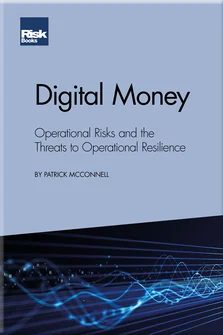Impact of digitisation on operational risk organisations
Introduction: Money is information on the move
Trends in digital money
How digital money creates new operational risks
Operational risk and cryptography
Operational risks of digital money
Commercial bank digital money
Private digital money, including cryptocurrencies
Public digital money, including CBDCs
Impact of digitisation on operational risk management
Impact of digitisation on operational risk organisations
Impact of digital money and operational resilience on ORM processes and people
Impact of digitisation on operational risk management in the future
Theory of money
Information theory
Classical cryptography
Modern cryptography
Conclusion
Acknowledgements
Appendix 1: Significant contributors to information theory and cryptography
Appendix 2: Timeline of significant contributions to information theory and cryptography
Appendix 3: Relevant information standards
Appendix 4: High-level risk registers
Bibliography
Chapter 9 discusses the impact of digital money and operational resilience on ORM organisations, particularly how they would interact with other departments in the firm, especially IT departments, as processes become increasingly digitised.
OPERATIONAL RISK MANAGEMENT IS AT A CROSSROADS
The discipline11 ORM is a discipline rather than a profession as there is no formal set of ethics governing the people involved and no agreed body of knowledge. of ORM is at a crossroads. Arising out of some serious banking incidents, such as the failure of Barings Bank in 1995 (Blacker and McConnell, 2015), the concept of attempting to proactively manage operational risks in finance, in addition to the traditional credit and market risks, was promoted in the early 2000s, mainly by regulators. The first sets of capital regulations aimed specifically at operational risk were promulgated by the BCBS (2001), and the first models of ORM practice were described in Risk Waters Group (2001).
One of the initial barriers to the development of ORM was the implicit assumption that operational risks were like credit risks and market risks in that ORM was essentially a quantitative discipline – and that loss models
Copyright Infopro Digital Limited. All rights reserved.
As outlined in our terms and conditions, https://www.infopro-digital.com/terms-and-conditions/subscriptions/ (point 2.4), printing is limited to a single copy.
If you would like to purchase additional rights please email info@risk.net
Copyright Infopro Digital Limited. All rights reserved.
You may share this content using our article tools. As outlined in our terms and conditions, https://www.infopro-digital.com/terms-and-conditions/subscriptions/ (clause 2.4), an Authorised User may only make one copy of the materials for their own personal use. You must also comply with the restrictions in clause 2.5.
If you would like to purchase additional rights please email info@risk.net











